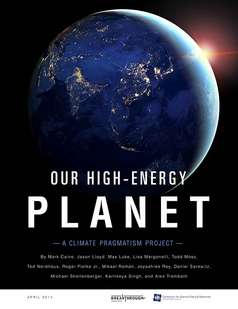Expanding energy access key to solving global challenges

Giving the poor access to reliable modern energy offers a better route to address global challenges, climate and energy, scholars say in a new report, Our High-Energy Planet.
The report is the first of three in the Climate Pragmatism project, a partnership of Arizona State University's Consortium for Science, Policy, and Outcomes (CSPO) and The Breakthrough Institute.
"Climate change can't be solved on the backs of the world's poorest people," said Daniel Sarewitz, a report coauthor and co-director of CSPO. "The key to solving for both climate and poverty is helping nations build innovative energy systems that can deliver cheap, clean, and reliable power."
More than one billion people globally lack access to electricity, and billions more burn wood and dung for their basic energy needs. The report outlines a radically new framework for meeting the energy needs of the global poor. According to the authors, the massive expansion of energy systems, mainly carried out in the rapidly urbanizing global South, is the only robust, coherent, and ethical response to the global challenges we face, climate change among them. The time has come to embrace a high-energy planet.
Innovation is the key to reducing emissions while expanding energy access. Power sectors are growing at breakneck speed in emerging nations, and their development creates tremendous opportunities for innovation. For instance, in order to reduce energy poverty within their borders, China and India are pioneering the use of advanced nuclear generation and carbon capture and storage (CCS). To continue and accelerate this progress, wealthy nations must support energy sector growth, and provide leadership in their own modernization efforts. America's longstanding commitment to innovation, for example, has helped drive its move from coal to include nuclear, renewables, and natural gas.
The poverty, inequality, health problems, and environmental degradation that result from a reliance on traditional fuels can be alleviated most effectively through a commitment to truly equitable energy access. Such a commitment, the authors argue, "empowers growth and development using the broadest array of energy services, technologies, and policies that can meet the manifold needs of developing societies." This provides the foundation for the innovations that will transition the world toward a high-energy, low-carbon future.
More information:
thebreakthrough.org/index.php/ … r-high-energy-planet
www.cspo.org/research/implemen … g-climate-pragmatism
Provided by Arizona State University



















